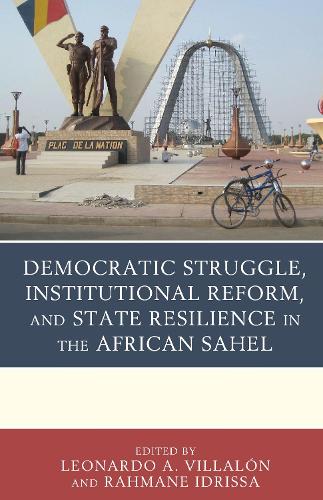
Democratic Struggle, Institutional Reform, and State Resilience in the African Sahel
(Hardback)
Available Formats
Publishing Details
Democratic Struggle, Institutional Reform, and State Resilience in the African Sahel
By (Author) Leonardo A. Villaln
Edited by Rahmane Idrissa
Contributions by Leonardo A. Villaln
Contributions by Zekeria Ould Ahmed Salem
Contributions by Ismala Madior Fall
Contributions by Moumouni Soumano
Contributions by Augustin Loada
Contributions by Mahaman Tidjani Alou
Contributions by Lucien Toulou
Contributions by Rahmane Idrissa
Bloomsbury Publishing PLC
Lexington Books
6th February 2020
United States
Classifications
Professional and Scholarly
Non Fiction
African history
320.9660917541
Physical Properties
Hardback
230
Width 162mm, Height 232mm, Spine 23mm
522g
Description
Long on the periphery of both academic research and international attention, the countries of the West African Sahel currently find themselves at the center of global concerns over security, terrorism, migration, and conflict. Since the early 1990s the Sahelian states have also been engaged in political struggles over the construction of democratic institutions. Edited by Leonardo A. Villaln and Abdourahmane Idrissa, Democratic Struggle, Institutional Reform, and State Resilience in the African Sahel addresses a key and little-studied question: How have the politics of democratization across the Francophone Sahel shaped processes of state-building, and with what effects on the resilience of state institutions Departing Starting from the premise that variation in the politics of institution building and institutional reformalthough most frequently justified and debated in terms of democratizationhave differing impact on the construction of resilient states , this book examines these processes in six francophone states of the Sahel: Senegal, Mauritania, Mali, Burkina Faso, Niger, and Chad. The contributors represent a set of distinguished scholars from across the region, many of whom have also been important actors in the struggles they analyze.
Reviews
This is an important book because it collects together valuable lessons from a number of understudied countries and connects them to key debates within the literature on democratization andAfrican studies. The fact that the introduction integratesthe insights from the different chapters into a helpful conceptual framework means that it stands above most edited collections and should be considered essential reading. -- Nic Cheeseman, University of Birmingham and author of Democracy in Africa
Author Bio
Leonardo A. Villaln is professor of African politics at the University of Florida. Rahmane Idrissa is senior researcher in the African Studies Centre at the University of Leiden.
